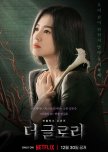
Gripping, intense, a success all round
"The Glory" comes with a drum roll at the turn of the year 2022/23. With a high-end production team in every instance, "The Glory" cleverly intertwines the burning subject of bullying with the long-running topic ´revenge campaign´. The result is gripping, intense, a success all round. (However, one major criticism: Netflix cuts the story in half with a long break in between.)In 2022, for the sad issue of bullying, streaming services cleared the stage several times with their own productions (e.g. "Weak Hero Class 1" and "Revenge of Others"). All of these stories are unbelievable in their brutality and cruelty - teenagers against teenagers! No mercy. Without pity. Without scruples. Without any feeling of guilt. For once, I don't want to blame the streaming providers for the shown cruelty, on the contrary. Maybe the topic is in better hands with them because they have no problem with such radical scenes (compared to TV stations). Isn´t it simply scandalous that such unbelievable violent abuse - and may it be only half as drastic - is part of everyday life in (i.e. South Korean) schools and among young people? Even more scandalous: parents and teachers tolerate it or actively support it and even act up themselves.
"The Glory" swings back and forth between past and present and thus draws a complex picture of the individual characters. Back then the perpetrators, they are becoming victims today. Back then the victim, she finally wants to get out of her role and also make life hell for her abusers. The painful past provides the moral framework, allowing the audience to nod off the plans for vigilantism. Eventually, the protagonist also gains helpers on her way.
Sad enough, in "The Glory" no one is truly happy with their life except for the perpetrator's (still) innocent little daughter.
The bullies of that time live bored and/or stoned and still trapped in their bullying role. Still tangled up in their clique from back then in uneasy ties. None of them found ´true´ friends. Trust and love are words without substance in their life, which rather appears as a shiny variation of Hell disguised with silk and glamourous accessories.
The victim of that time, on the other hand, has found meaning, direction and grounding in her life, no matter how sad the circumstances. Coincidentally, she even made trustworthy friends. Since she has experienced firsthand what hell is like, she can at least distinguish it, as other experiences of brief moments of happiness are also indicated in between. This experience (how happiness actually feels compared to suffering) puts her ahead of her opponents, who aren't even aware that they're living in a hell of emotional emptiness. They only suspect it when Moon-Dong-eun threatens to shake their house of cards and they have to face the illusions of their self-satisfied lives.
The story isn´t completely told yet - after 8 episodes. We will see, how things actually turn out for Moon Dong-eun, as she is indeed messing with someone, who is not willing to give in, whatsoever...
---------- EDIT after finishing the SECOND SEASON: -------------------
Well. Second season is definitely on the revenge-side. Some may say revenge is sweet. In any case it is drastic. And "the Glory" made sure, the mean-spirited deserved it... Among them is so much violence and exorbitant abuse. Almost too much to bear at times. A bit overdone maybe with unnecessary Netflix ruction here and there. Nevertheless suspenseful. Certainly with a coherent ending.
-------------------------------------------------------------------------------
PS.:
Actually, the screenwriter is herself mother of a high school student...)
----------------------------------------------------
SIDE NOTE: ---- Fiction and reality are not that far apart ---
Some might say that the bullying brutality in "The Glory" - such as the curling wand scene - was exaggerated.
In fact, in South Korea in 2006, there was just such a case.
At a middle school in Cheongju, a student was bullied for money by three classmates. For not delivering, she was beaten with a baseball bat, tormented with a barrette, kicked, hit with fists, and burned on her arms with a hot curling wand. The burns didn't even have time to heal because the girls checked the temperature of the curling iron on the victim's arms again and again every few days. On the contrary, healing blisters were specifically removed by the bullies with their fingernails. The brutal beating also resulted in an injury to the tailbone, which resulted in a six-week hospital stay.
In fact, in this actual case in Cheongju, the perpetrators were apparently officially punished after the victim, despite threats, reported the perpetrators by name. And not only the perpetrators, but also the school administration and teachers were apparently sort of admonished. (However, with that the police report ends. We do not know how the victim, the perpetrators and the school dealt with each other afterwards).
--------------------------------------------------------
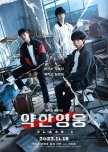
Intense. Brutal. Yes, I recommend it. And with a heavy heart I am also considering it valuable
"Weak Hero Class 1" leaves me with mixed emotions. It is an intense KDrama, in which the young people are remarkably slow-paced, sort of numb, at times bordering on apathy. On the other hand, there are violent outbursts. Extreme. Brutal. A cruel parallel world that actually should have no place whatsoever in the everyday life of high school students!What kind of society do we live in? It is simply too much, what young people have to go through and deal with. KDrama didn't invent it. Neither does the webtoon, the story is based on. It is a sad and scandalous reality in many schools, in many classes, in South Korea and elsewhere.
"Weak Hero Class 1" doesn't sugarcoat anything.
And it ends just the way it is... no end in sight...
I admit, I was about to drop it. Too much frustration and violence - it actually goes on and on. (Even if the 'weak hero' develops cunning, inspiring recipes to fight back... it still remains a world of violence.)
But then the relationship dynamics between the boys (and girls) are quite intense and what they go through inside and out is touching. Ultimately, it doesn't help to look away - even if it's painful to look at. In fact, "Weak Hero Class 1" is a great, impressive production. It is a disturbing inventory - disturbing because the story leaves no perspective, no silver lining, no substantial room for hope. (At most marginal sparks of light here and there.)
The largely indifferent attitude towards life that prevails in posture and movement of the young people is one thing, the massive outbreaks of violence another. Each soul seems to have long since fled its young body, so that there are only roughly apathetic youths on the move who occasionally act as numb thugs who kick helpless bodies on the ground, or vice versa. It's actually unbearable. It's traumatizing on both sides. And yet it is everyday life. This creates a very unique flow in the world of the students. In this world, one may search in vain for serious, responsible, courageous adults. They are lacking. The kids are alone in this world and have to find their way to live in it, or rather: to survive. Which side will you be on? Perpetrator? Victim? Rescuer? Spectator?
What agitates me the most in connection with "Weak Hero Class 1" is the enormous enthusiasm among der age-group of 13-17, who with this story obviously feel seen right on. This may be 'only' a fictional story, but it obviously tells the story of the youth, we (adults) usually dont´t get. Many are thrilled. In fact, I'm NOT thrilled. I'm impressed by the intensity of the production, yes. But primarily appalled by the dominance of bullying and the severity of violence among peers in everyday school life today. I am also shocked by the documented, self-evident aimlessness and helplessness of the adults. Ultimately, I am frustrated by the lack of a positive outlook and affected by such a disillusioning world of experience of the young, growing up generation.
"Weak Hero Class 1" is based on the template of a web toon and has (via KDrama) by now reached an even wider audience, especially among the 'adults', regarding bullying among schoolchildren. I appreciate that. The KDrama was released on the young streaming platform Wavve and was thus able to give plenty of dramaturgical space to the violent excesses. Maybe more than necessary? Or just right? The KDrama has a simple mission: to show what 'we' tend not to see because 'we' (adults) have no place in this parallel world of schoolchildren. And as a matter of principle, the story does not provide any answers in terms of a way out. No.
In the contrary: 'we' adults are in the pillory... What have we done (and also missed) that it could have gotten this far! Where is this going to end? What can we do about it?
Anyway, bottom line: I recommend the series. And with a heavy heart I am also considering it valuable especially for all those who call themselves adults, parents, teachers, social workers, officials in youth welfare offices, police officers, etc....
Hello, wake up!
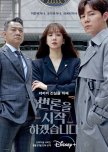
Nonchalant, sassy, intelligent - a solid enrichment among law&order dramas
"May it Please the Court" is one of my favorite series amid the flood of Law & Order series 2022. I appreciate its witty and grounded touch. I also appreciate the playful, sassy and natural at ease dynamic between the two leads. You get wit without silliness and on top of that an exciting story. In addition, the question (which is obviously burning at the moment in South Korea) about the solid handling of the rule of law in the face of apparently overpowering forces that control politics, the executive and the judiciary, is intelligently incorporated into the network of relationships and case processing.The story is based on a book with real cases, written by public defender Jeong Hye-jin ("Let Me Start the Argument"). This makes the Disney production a solid enrichment for current courtroom dramas. In addition, this KDrama doesn´t try to downplay its KDrama roots in favour of international streaming market standards. The KDrama remains true to itself and doesn't rely on more violence or sex than usual It rather builds on proven emotional storytelling with an excellent cast and a loving eye for the nuances.
The intro offers an impressive, brilliantly cool stylization of the KDrama orbit, in which the one percent of society is always involved: the fircely quarreling, shaken by internal intrigues and secrets, outrageously rich family clan, in which everything is about the best law firm, the greatest impact on the prosecutor's office or the fat contract. Here you have to be clean, untouched, respectable (which you rarely are). The profession of choice is a lawyer and/or sooner or later assemblyman and ideally a presidential candidate.
So far, so good... we´ve seen it many times. Now, however, the story is driven by a new powerful perspective: the world of public defenders who handle legal cases from the world of ordinary, often destitute people at the bottom of society. Worlds clash - worlds both with people involved. The interface is incorporated by No Chak-hee, who has lived in either. As the number 1 in the law firm, in which she has just been promoted to the youngest partner, she is being transferred to the mandatory public defense. What she doesn't know: this is mere political calculation of her very esteemed superior. What she also doesn't know: the encounter with her new colleague and the world of public defense will unhinge her worldview and give her work new direction and grounding.
Suspense has the central characters fatefully under control. A series of murders occur. Crimes emerge behind old, long solved and forgotten cases. No Chak-hee realizes that even she can no longer wash her hands in innocence. Guilt. Innocence. Right. Wrong. Culprit. Victim. Justice. Injustice. The perspectives get a bit out of the sounding line.
KDrama at its finest. Good entertainment, while also being socially critical and up to date. Pithy. Nonchalant. Intelligent. Exciting. Romantic vibes included.
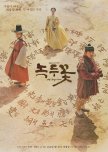
Fight for human rights. A story written with the blood of latest Joseon history. Highly valuable.
Definitely worthwile! "Nokdu Flower" offers a historically remarkable epic with a strong performance. The KDrama excels sort of. It almost seems as if the entire team was all too aware of the ambitious challenge to adequately capturing this short but crucial sequence of Korean history.In the second half of the 19th century, exploitation, famine, a corrupt, incompetent government and weak kings had eroded almost all belief in the existing system, in aristocracy and administration. Then there was the opening of the country to world politics and trades, for which the corrupt Joseon also proved to be profitable. In this historical KDrama it's not so much about the political intrigues around the palace, but about the landowners, administrative offices and Yangban in the provinces as well as the rebellion of the desperate rural people, who simply can't take it anymore.
The struggle for democracy in Korean history, like elsewhere in the world, has been quite bloody. That was last in May 1980 in Gwangju, when the democratic aspirations of the people were brutally crushed by the military. This was so during the student independence movement in 1929 in the fight against Japanese oppression. And that happened in connection with the Donghak movement, too, which had caused quite a stir throughout the country between 1860 and 1894. "Nokdu Flower" is deliberately very close to the front lines of those uprisings for democratic reforms, which then had been for the first time organized on this scale. This forms the perfect background for dramatically intertwined relationship dynamics of two half-brothers, (whose father is one of the particularly exploitative provincial officials who bleed the people dry), as well as the daughter of a merchant, who is used to deal with anybody, even the Japanese, for high profit.
The road to democracy on the Korean Peninsula is definitely rocky. To this day, the reactionary forces are still strong. "Nokdu Flower", however, represents a powerful, unforgettable symbol for the spirited struggle for freedom. The Donghak movement is often seen as the first patriotic Korean movement, since it was also about counteracting the increasing e. g. Japanese influence. But more than a patriotic struggle, initially the Donghak movement was actually about an idea that is bigger than family of origin or nation: It's about basic human rights. (An idea that, not too long before that, had also stirred up the European continent)
Matter follows spirit. And this spirit was shaken up in the rural population of Joseon by a new religious movement: Choe Je-u (1824–1864) created a new faith in 1860: Donghak, which roughly means "Eastern Wisdom". Drawing from Confucianism, Buddhism, Taoism and Shamanism, it sees the divine spirit at work in human beings - in ALL human beings, without distinguishing between class or gender. Additionally, it sees the world as moving in cycles - with a whole new world just waiting ahead.
Nevertheless, it is blood that paves the path to a new era. Eventually, the results of the first Donghak peasant rebellion included a treaty. The "Gabo Reform" recognized the new religion, and among other things, the lowest classes were freed, widows were granted the right to remarry, and penalties for corruption and abuse of office were introduced. Unfortunately, there followed a second peasant rebellion...
This is a story written with the blood of latest Joseon history, sort of.
Overall, a highly valuable production.
--------------- BY THE WAY... ----------------------
...the traditional Korean national dish BIBIMBAP is closely linked to Jeonju and to the Donghak uprising. The heart of the rebellion was in Jeolla province with Joenju being the provincial capital. Among farmers who did not have the time to prepare countless side dishes, it was common to simply mix whatever there was with rice and spices. This food proved its worth, especially when it came to feeding the rebels in their brave fight for new values and a more just future.
... the TITLE TRACK is actually a popular folk song that goes straight back to the peasant uprising. "Nokdu Flower" actually means 'blossom of the mung beans', but here it refers to the nickname of Jeon Bong-jun, leader of the peasant rebellion.
"Bird, bird, blue bird,
bird, bird, blue bird,
Don't sit in the mung bean fields.
When the blossom falls
the farmer goes to cry.
Bird, bird, blue bird,
Jeonju Gobu Nokdu bird,
why don't you fly away
The pines and bamboos are green.
We thought it was summer
yet it's bitterly cold and snowy."
The blue bird refers to the Japanese - they shouldn´t have any business in Joseon and should go away. Joenju and Gobu are legendary places of the uprising. Nokdu refers to Jeon Bong-jun´s nickname and the riot. However, Nokdu, the mung bean, also refers to an important agricultural product and food. Falling blossoms indicate a bad harvest. The 'summer' stands for the first uprising, the 'cold winter' for the second. The song was probably born during the execution of the leader Jeon Bong-jun and has since become a nationwide folk song in several different versions.

If you´re in the mood for divertingly wasting your time in (retro-)style...
If you´re in the mood for divertingly wasting your time in style (retro-style to be precise).With a lightweight story, lots of action and some fun, too, this will perfectly do.
Its professionally done. You won´t regret it.
Other than that:
Too fast to be substantial or something that lasts or give something that remains. The focus here is on visual and acoustic effects. Storytelling is secondary. At least there was no saving on top-class actors. And, yes, they are in a good mood.
Recipe:
-top-class cast
-action with car chases
-hip scenery locations in the look of the 80s
-speed
-fancy retro styling - cool retro fashion (if you´re into it)
-all sorts of retro cars - styling and tuning (and noises, too)
-light and camera effects
-deliberately/supposedly ´cool as cool can be´
Final remark:
Never mind the drop of truth behind the backstory - corruption and money laundry in the context of the 1988 Olympics in SK. The bad (and good) guys could be anyone, anywhere. That's just the hook to give an interchangeable action movie at least a coating of its own: a Seoul-Vibe - here in an 80s retro look. (However, even this particular ´SEOUL´ Vibe shown could actually be anywhere - It´s more about an ´80s´ Vibe)
Overall, the movie comes across as a solid action movie production for an international audience.
Don´t expect unique Korean-style. (Except for the cast and their acting of course ... and even they can usually do much better, too...)
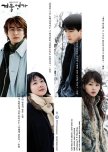
An impressively touching love story. Performed with passion. However, It´s makjang. Be prepared.
The biggest impetus for the KWave came from "Winter Sonata" - this KDrama is almost a blockbuster among KDramas. Its success was enormous. The series sparked its own fan tourism to filming locations on Nami Island, Geojie Island and Chuncheon that continues to this day. The soundtrack also wrote history. In the meantime there is an anime version of the story, a musical production as well as a manga and a Playtstation version...The love story is told in an impressively touching way and performed with passion. In beautiful pictures and with plenty of dramatic twists. The chemistry between the two main actors is perfectly tuned. Bae Yong Joon even shines in two roles at the same time.
However. It is makjang! Twists and turns awaiting around each and every corner. Be prepared for sorrow. You might get angry more than once. The protagonist´s can get on your nerves. For sure. Don´t complain. I told you. It is truely astonishing that still (if you are ready to sympathize to some extent) you will ´enjoy´ the show. ... whereas ´joy´ might not exactly hit the spot... :-)
In case you are not aware (as I wasn´t at first):
Since the story begins in the youth of the main characters, you also get an impression of the Korean lifestyle and everyday life in the late 1980s and 1990s, with true ´democracy´ in South Korea still being in diapers and a conservative, strict, authoritarian aura dominating everyday life. When I saw the series for the first time, I didn´t know much about the political and social conditions. Plus from my German background those morals, values and virtues all seemed old fashioned and in my life rather outdated - it reminded me more of the world of the old black and white movies of the 1930s and 40s: hierarchies and manners, the decisions of the protagonists, the prevailing moral concepts, all of which I - today, far away in Germany - could only shake my head at. Now, as I have learned more about South Korean culture, I know better, where this is coming from... Sympathy and compassion are thus enhanced.
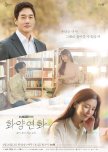
Good stuff. Complex. Powerful at times. Yet you better don´t set the primary focus on the romance.
No idea why the international title is what it is... so beware! If you're expecting a love story here, you'll get one, but certainly not in the way you thought it would. With their motifs and soft focus, the posters for the KDrama also promise more heartbreak of the shallow kind than the story does justice to.
The original title "The most beautiful moment in life - the moment when life becomes a flower" describes the moment in which life (not love) acquires meaning, beauty, direction, form and can blossom. And here we are closer to the topic. The two protagonists have been in love with each other since their student days in the 90s. Yes. But it has grown through their attitude to life, the meaning they give to their own lives, through their principles and quite specifically through the class struggle, the union struggle, the demonstrations for more democracy. By boldly standing up for what they believe in, life is transformed into a (bright, fragrant, inspiring) flower.
To reduce life and its beauty to love would not be enough. But love is definitely part of it - just like water or the sun - to let these flowers (which can/want to be a person's life) grow. This flower reveals its inherent beauty in the creative expression of what is important to you, what you stand for, what you believe in.
In that sense, Yoon Ji-soo's seedling came to life after she met Han Yaeh-hyun during his pro-democracy and workers' rights protests. Ji-soo's enthusiasm for Yaeh-hyun's cause didn't go unnoticed for him either.
-------------- SIDE NOTE: --- Early unionists, political protest and rebellion against injustice ---
We are learning about South Korean democracy movement when it was still in its infancy. During the decades of the dictatorship, conservative politicians skillfully exploited the fear of the communist north and consistently interpreted or pursued any commitment to workers' rights as a communist threat. Strikes and demonstrations were always uncompromisingly dispersed and participants and leaders sentenced to prison terms. Even recently, in the last 5 years, trade unionists, fighting for workers' rights, have been and continue to be arrested for "offences against public order". In the case of convictions of corporate bosses/Jaebeol, a pardon usually follows quickly. Unionists, however, always have to serve their long sentences. Recently, for example, the KCTU chairman Han Sang-gyun was sentenced to three years in prison during an organized mass rally for workers' rights (2016) and Jang Ok-gi from the construction workers' union was imprisoned for a protest march for higher pensions for non-permanent construction workers (2017).
---------------
So the context of this love story is quite serious. And the KDrama cleverly wraps and links this 'seriousness' around the love plot of the two protagonists. The story is told in time leaps between then and now. It tells how Ji-soo's father (head of the district attorney's office) opposes the young love, it tells about Yaeh-hyun's father's unsuccessful struggle for worker´s rights, about Jaebeol Jang Sang, into whose family Yaeh-hyun marries, and about the unscrupulous intrigues of father and daughter, as well as the elite family of lawyers that Ji-soo married into. It tells of the intolerable arrogance of the wealthy towards the lower-income classes, which continues in the form of bullying among their children. It tells of courageous class struggle and rebellion against injustice. It tells of the almost hopeless struggle for one's own rights in the face of powerful opponents. And that it's never too late to let the flower of your life bloom.
So, should you watch it? Yes, it´s good stuff. Complex. Powerful at times. But don´t set the primary focus on the romance. Otherwise you might be a bit disappointed.
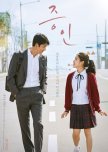
Sensitive, optimistic and even cheerful. No spectacle, and yet the 2 hours somehow fly by.
"Innocent Witness" does not really want to serve any genre. (I assume, in Germany it would have at best as been shown in Television only. Significantly, the movie never made it to European cinemas. Yet, it was shown on the big screen in South Korea and was also shown throughout Asia and Australia. It actually won a whole series of respectable awards. On the list are 55th Baeksang Arts Awards, 39th Golden Cinema Film Festival, 40th Blue Dragon Film Awards, 6th Korean Film Producers Association Awards, 27th Korean Culture and Entertainment Awards and 39th Korean Association of Film Critics Awards ... Those various awards were given for the characteristically sensitive, emotional storytelling and presentation."Innocent Witness" isn't kitschy, it's calm. The story does neither live from driving tension nor offer any dazzling action, just a calm, unobtrusively touching story. The viewers spend a lot of time in the courtroom. However, Law & Order might very well form the framework, but this does not determine what the story is actually about: Communication and reciprocal understanding can only really succeed if you unconditionally focus on the personal world of others, not only your own. This is often forgotten because we think we can easily understand each other when your world and mine seem so similar. (As if we could simply take sameness of a life context for granted.) However, even life perspectives would be similar, this can still not be considered ´mutual understanding´ either. This is mere prejudice. That could work, often does, but doesn't necessarily have to. Most of the time it might fit, so there's rarely a reason to question my personal approach to the world.
"Innocent Witness" is provocative here, because the other person is a young girl with an autism spectrum disorder. In order to reach an understanding, the lawyer and everyone else have to get involved in the world of the protagonist and (arduously?) learn to understand the events and happenings from her perspective. The confrontation with the autistic worldview (in the service of the story quite strikingly, but effectively implemented) may seem crass for most people at first glance, but basically it only demands what we should actually get do in EVERY encounter with every person, with whom we exchange ideas. That is: get involved. Eventually, we are reluctant ... as long as it works otherwise even half-way and the misunderstandings don't catch up with us all too painfully at some point...
"Innocent Witness" pushes the audience to this realization with persistent, warm, quiet tones in a determined and consistent manner. At the beginning there is the girl's question: "Are you a good person?". In the end, the lawyer comes to the realization: "I want to be(come) a good person!" The movie portrays this process purposefully, but quite unspectacularly and without any particular cinematic originality. The gait is characterized by a loving grunt, like a basso continuo, which bathes the punchlines in a warm light and holds the story together on an emotional level. This, however, without wanting to be difficult or too serious. The lacrimal gland is not necessarily strained either. On the contrary, there is also room for a smile, for joy and a good mood.
In short, the essence of the KMovie is the wonderful dynamic between lawyer and witness. Up-and-coming talent Kim Hyang-gi shines in her role as an innocent, often for her autism bullied, young school-girl. Veteran Jung Woo-sung, on the other hand, as a once ambitious human rights lawyer, neither fish nor meat, still single at almost 40, who has gotten a bit off track and becomes seductive because he needs money for his father's Parkinson's treatment. They stumble a little awkwardly into their interpersonal encounter, each in their own way. Dealing with their own feelings and those of others is not their strength. Nevertheless, out of the given need to get involved, a peculiar friendly relationship develops slowly, quietly, subtly, sensitively and sustainably. Initially however, it is quite an ambivalent dynamic. The attorney's original intention is anything but pure at first, when he wants to vet the only witness who claims to have seen his client's murder. In his approach to the witness, he is only concerned with his case and the question of how seriously he must take the witness for the course of his case. The unexpectedly blossoming friendship has an unfair origin that gradually overshadows the encounters. Nevertheless... The two mimes of the protagonists as well as one or the other supporting role have well-earned all their awards, as they embody this dynamic magnificently.
Apparently, the mission of the movie is that people with disabilities are also people with dignity, who we should/must take seriously. Ultimately, however, the mission even goes beyond and demands respectful, serious encounters with EVERYONE - regardless of their origin or clothing, health restrictions or age. We usually avoid those who 'tick' differently, because it seems exhausting and inconvenient to really get involved with someone, e. g. to actually listen, to genuinely want to understand... because this sometimes requires having to question myself and my self-evident attitudes, assumptions and perspectives. It's easier to just take my own worldview for granted on the basis of prejudices as well as superficial encounter and project it onto those around me. Conversely, such an attitude can actually lead to my life becoming superficial... comfortable, pretty, nice and shiny maybe, but superficial...
So, this is a KMovie that plays a lot in the courtroom, but whose verdict on right and wrong is less about the actual legal case - it becomes a mere side issue. It is rather about demanding an honest verdict on our individual ways we interact with our fellow humans: Am I a good person? Am I really listening? Am I truly open to encounters? Are my priorities in life sincere?
"Innocent Witness" doesn't really serve any genre, and yet the story, told in all simplicity, is touching, optimistic and even cheerful. No spectacle, and yet the 2 hours somehow fly by.
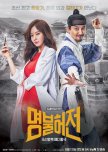
Time-travel with an enchanting encounter between traditional medicine & modern medical technology
Because "Live up to your Name" chooses time travel as the starting point for the action, the KDrama is able to contrast traditional medicine as well as modern surgery and medical technology in two historical time zones. This sprinkles a lot of color over the topic and opens up a perspective that does not have to polarize. This rapprochement is rounded off by the enchanting development of the relationship between the protagonists - the modern day surgeon in modern Seoul and Heo-im from Joseon days, who get emotionally involved over the course of the story, although their personalities could not be more different."Live up to your name" juxtaposes modern surgery & medical technology as well as traditional Korean medicine, which is recently becoming more and more popular in the increasing medical tourism in South Korea. In this context, the audience is introduced to a luminary of traditional Korean medicine who made a considerable contribution to acupuncture in his time (16th century) - Heo-im. The KDrama guarantees an entertaining and lively excursion into some background knowledge about attitude, methods and possibilities of traditional medicine.
Just seeing Kim Nam-gil as Heo-im is worth watching this KDrama. He does an excellent job of portraying the ambivalent personality: there is the simple man from a poor background, whom he would like to escape at any price, and there is the ingenious healer with almost spiritual talent. Sometimes it's quite funny and then again heartwarming and profoundly serious with confident lightness.
In addition, there are the traditional healing methods, the virtuosity in handling the acupuncture needles and the feeling for the flow of energy... this can not only be experienced with the example of Heo-im, but also with the other representatives of traditional Korean medicine. There is also room for dealing with those for whom traditional medicine is mainly a business today - a service that can be sold very well in South Korea these days, especially with a VIP upgrade as a trendy, exotic treatment method in the context of medical tourism. There are the VENDORS of traditional Korean medicine and there are the HEALERS of traditional methods. And then there is modern medicine and the growing market of the health industry. Eventually, what makes the difference (and also offers the common ground between paradigms) are the attitude, dedication and mission when it comes to healing...
------ SIDE NOTE: --- Historical Heo-im (1570-1647)---
His reputation as an acupuncturist preceded the historical Heo-im of his time - not only in the Joseon Dynasty itself, but as far away as China and Japan. Originally he was of humble origin, but due to his incredible achievements in medicine he became the personal physician at the royal court and a government official at the age of 30. During the Japan War, he was able to further expand his reputation through his gifted achievements in acupuncture. However, the nobles rejected him as their equal and excluded him, so that he returned to his village at the age of about 50 and practiced his healing art on the common people there until he died at the age of 77. In recent years he has written a large, well-regarded work, the ChimGuGyungHumBang (book on acupuncture and moxibustion). In it he describes his methods of pain management and procedures in which acupuncture points are not (only) stimulated by needle sticks, but also by heat.
-----------------------------------------------
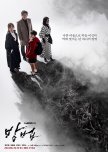
Thrilling. Unsettling to some extent. Additionally to an enthralling story you get great acting.
"The Cursed" puts Korean shamanism at the center of events. Shamans play their role again and again in KDramas - even if they are only indirectly present in the form of yellow adhesive talismans in red Hanja writing for fertility, luck, prosperity, etc. But in "The Cursed" they actively determine what happens. The shamans are distinguished by their spirit conection and/or have inherited their practice. To this day, Muism or Sindo - the shaman religion - is firmly rooted in everyday life as the oldest popular belief system.So you inevitably have to deal with magical rituals, shamanistic practices and (in this case) evil spirits who quickly possess people or e.g.. rather curse them. It is quite somber and frightening considering that mere human ability has little to counter these forces and practices.
Viewer ratings have more than doubled over the course of the TVseries. For South Korean audiences, the KDrama obviously struck a chord. For me it was an intense drama. Thrilling. Unsettling to some extent. Generally, I would recommend it, if you are open to face another realm besides our rational reality. Additionally to an enthralling story you get great acting. (No romance, though...)
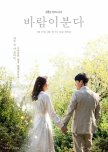
Years after the “Yes”-word, and yet a substantial love story, touching without being kitschy
"The Wind Blows" sounds quite inconspicuous, but it is not. It turns out to be a moving love story. Actually it is rom+/-com that starts exactly where other love stories end: with the ´yes´ word. The KDrama tells of what can happen when the butterflies (in the face of the new) are followed by ordinary years of shared, sometimes painful everyday life relationship... But that's not why love has to be gone missing. On the contrary... yet eventually, love might find it harder to take its space...The title "The Wind Blows" refers specifically to the moment when the two protagonists first met many years ago. At that time the wind was blowing. What started then is not over yet. Figuratively, the wind is still blowing. However, the everyday challenges of aging have now added to their married life. The two must meet those challenges. It is rather common that one may be tempted here and there to make solitary decisions instead of communicating. One may have doubts if there still can be a way together. Every now and then it seems that such a common path is not (or no longer) possible. And then, maybe, one or the other might open up again.
"The Wind Blows" tells a serious and profound story about a love relationship that has grown out of the first romantic phases. Generally, this is less wanted on screen, as it inevitabely comes with problems, arguments and breakups. (Somehow that's in the nature of relationship - the constant rubbing against each other in a wide variety of ways actually leads to feeling/sensing yourself and the other person in the first place... it doesn't work without it. Does it?) In this KDrama, problems, arguments and breakups are all in, too. But so is love. (...as so often, although we might fail to notice in the midst of turmoil.)
I don't want to hide the fact that Alzheimer's disease is involved here as a stab in the back and at the same time a second chance. Against this background, the story manages to tell sensitively, empathetically and at times ruthlessly about the bumpy stretches of a patient love that has been and remains there over time - even if it is experienced differently over the course of the years, perhaps sometimes cannot be shared and also has changed its forms of expression over time.
The sensitive processing and the emotionally intense acting (great: Kam Woo-sung and Kim Ha-neul) are KDrama quality at its finest, which has once again proven itself to be just perfect for dealing with such a complex subject, which is difficult in several respects. A substantial story, touching without being kitschy.
(Well, I didn´t need the slightly shallow subplot and few unnecessarily humorous sequences here and there. Yet they obviously tried to loosen things up... well...)
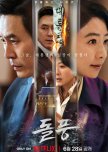
A very well done, substantial, self-critical, thought-provoking Korean-style political drama.
In “The Whirlwind,” the old masters of Korean film and television use their strong aura to demonstrate what it means to truly want to represent transparency and democracy in South Korea 2024. Even after several decades of 'real' democracy, the political apparatus still feels like a vice in the hands of a few in a backroom and every idiosyncratic move inevitably leads to pain. Here we see the top-class veterans Sol Kyung-gu and Kim Hee-ae and a few more in a Netflix production that has substance and intensity and decisively highlights a major dilemma within the South Korean political scene. A great script with characters who are not just black or white, but full of shades of gray.2024, as I said. Unfortunately, the struggle to act politically honestly, or to curb corruption and illegal influence by the Jaebeol conglomerates, obviously still is a Sisyphean mission... But there is this longing in the country – a desire that politics will at some point be done by responsible, accountable citizens and not manipulated by this 1 percent of the Jaebeol elite, using the system for their own benefit. ((On the other hand, as a mass, that is all too easily manipulated by misleading information the (in theory powerful) people ultimately doesn´t impress as a source of hope... Sobering. Unfortunately.)) Obviously it is difficult to change the sluggish but powerful apparatus. However, the more scandalous conditions and dynamics are clearly communicated through the media, the more the shiny elite may become disenchanted (as in "The Whirlwind"). And perhaps - the more this happens - at some point the general public will no longer be so easily swayed and deceived. Perhaps, slowly but surely, the number of those, who dare to oppose the whims of the so-called elite, no matter the cost, is against all odds growing. And maybe more and more will follow over time. This is, where “The Whirlwind” is coming from...
In 2024, South Korean politics is no longer just a male affair. Nevertheless, the world of decision-makers is still a world of cliques, and if one person is not willing, then force will be chosen. The pattern seems to be the same forever.
And yet. In this KDrama we are dealing with a protagonist, who doesn't care about all the headwinds. He isn´t impressed. He doesn't want to be bought and is resisting temptation. He might become a role model, yet he is driven by his own interest. He cares about the cause, the idea, his political values, and he risks everything for it. The end - the good, honest one - justifies the means. And suddenly an upstanding citizen also attracts others, too. He embodies a longing, stands for a hope that is truly shared by many - even those who have learned to function well within the corrupt apparatus. Where there is a will, there may be a path, but it can be rocky, swampy and, in some places, hopeless. Once again a brave David has faced off against a complacent Goliath. And if he's not careful, even our ambitious David may imperceptibly stray from the right path on his way to an honest goal. Because in fact, not every means justifies its noble end... When it comes to a world of responsible citizens who are equal before the law, then it is at the same time and first and foremost about accountability and about taking (lawful) responsibility for one's own actions. In all consequence. This equally applies to everyone, too. Uncompromising. Without exception...
So, overall I consider “The Whirlwind” a very well done, substantial, self-critical, thought-provoking Korean-style political drama.
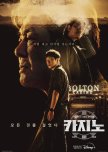
Casino-gangster-crime atmosphere with an exotic ambiance. International style. Takes its time.
"Big Bet" was inspired by the legendary persona of a South Korean casino manager who made it to the top of the multi-billion dollar casino world in the Philippines... until he was framed for murder."Big Bet" is another KDrama that has been divided into two halves in streaming provider style. (Unfortunately, this is kind of becoming the new KDrama fad and I'm already bored to express my anger about it.)
Oh yes, and I'll say it in advance: if you're interested in the series because of Son Suk-ku, you'll have to stick with it for quite a few episodes - he doesn't appear until the end of the first season...
The Disney production deliberately presents itself internationally. Nevertheless, one gets some atmospheric, socio-historical milieu impressions from South Korea - especially from the 1970s and 1980s, because the story is repeatedly enriched by flashbacks. (In fact, the first season is almost one great flashback - with flashbacks within that flashback, so to speak.) While the first season is designed primarily as a character study of Cha Mu-sik, the second season arguably has the real crime thriller behind it. Topic: Murdered South Koreans in the Philippines and the associated dynamic between the South Korean-born, now renowned casino manager, who has now become a murder suspect, and the investigator Oh Seung-Hoon, who was sent to the Philippines from South Korea. So the actual "big bet" only really becomes an issue in the second season.
So what does the first season have to offer?
Plenty of impressions of Mu-sik's childhood days, youth (wonderful: Lee Kyu-hyung as a youthful Mu-sik - although eventually Lee Kyu-hyung has meanwhile left his youth behind him...) and of his first professional steps into Casino world as young adult. The protagonist has his own charm and amazing talents and so we experience Mu-sik, although he radiates some sort of unapproachable aura, as an authentic and fascinating man with plenty of heart and mind, with a quick grasp, good intuition, radical consequence and entrepreneurial charisma.
"Big Bet" is a Korean-American production. It is international in its self-image and presents itself as such. It is made by men and it is about men. About smoking men. Sweating men in suits. Men with tattoos, too. The man with the most screen time is “Oldboy” Choi Min-sik (from the acclaimed 2003 K-Movie). He plays his role effortlessly as a 30-year-old and almost 60-year-old alike (thanks to modern filming and image processing technology). For "Big Bet" he is back in top form after a decade-long break. All in all, in this KDrama we slide into a (conservative) world of men and gangsters. Their wives, if there are any, are at home with children and really don't know anything about anything. Exceptions are the wealthy, and due to her wealth influential CEO Ko (with a rather quick appearance but comparatively lasting impression: Lee Hye-young) and the young, by Korean standards sexually quite explicit, self-determined hotel employee Kim So-jung.
In the flashbacks, as I mentioned before, there is South Korea at times. Nonetheless, "Big Bet" is principally based in the Philippines. Filming there took about 3 months. This promises exotic local hue, although the focus is on the casino and hotel world - which in turn could somehow be anywhere. No expenses were spared with the casting either. Even the supporting roles were selected with care.
In short: "Big Bet" (Season 1) is a solid and ambitious character study of Mu-sik. His Story is told in a sophisticated way and staged well worth seeing. However, the series isn't really a KDrama-like KDrama. Anyone who likes a casino-gangster-crime atmosphere with an exotic ambiance will get their money's worth here. However, the story takes it´s time. It remains to be seen what the second half will come up with. I certainly have high expectation that "Big Bet" will even improve, now that Oh Seung-Hoon intrudes into Mu-sik's world with his investigations and thus will add further dynamic.
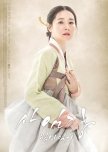
Visually stunning with a truly poetic story. Insights into the early 16th century art included
"Saimdang, Memoir of Colors" is an excellent KDrama with historically impressive dimensions. The focus here is on the legendary artist Shin Saimdang, whose head is also depicted on the 50,000 won note today. The KDrama pays tribute to the great artist and also pays tribute to her roles as a devoted mother and virtuous, yet uncompromisingly progressive woman. The focus is on a time and space transcending, tragic love story - fictitious... or at least not historically documented. (But why should´t it have happened in this way or another? ... :-)----------------- SIDE NOTE --- Shin Saimdang (1504 -1551) ---
... was a painter, calligrapher and poet who was valued in her time and far beyond. Since her father had no son, he gave her (rather unorthodox for a girl) an education and training in literature, poetry, calligraphy, embroidery and painting. Her works as a painter are characterized by their particularly sensitive view of nature and its subtle, sensitive representation. Today only about 40 paintings in Indian ink and mineral colors can be directly assigned to Saimdang. However, it is suspected that many more works of art have survived, although they are not clearly signed as her works. Shin Saimdang has also gone down in history as the ideal of the good mother. She had five sons and three daughters, some of whom also inherited their mother's talent. One of her sons is the even more famous Neo-Confucian scholar and politician Yul-gok Yi I.
-----------------------------------------------------------------------------
In addition, as far as the perspective of traditional art is concerned, the special focus of this KDrama is the nature of the world of animals, plants and mountains. Actually, it could be mentioned here, that South Korea is characterized by several mountains and 21 national parks on more than two thirds of the country's surface. This KDrama aesthetically focuses on the spiritually legendary mountain region around the Geumgangsand - The Diamond Mountain. It probably got its name in connection with the Diamond Sutra of Buddhism. It was a center of Korean Buddhism, traces of which can be dated back to the 1st century. At the beginning of the 20th century there were still more than 40 active monasteries in the region. In any case, the mountain world plays in several respects an important role in this gripping historical drama.
Special dynamics arise through the play with intertwining time and space. There are two plots. One is set in 2017, the other in the early 16th century during the Joseon era. One follows a young art historian writing her PhD thesis on artist An Gyeon's work 'Geumgangsando'. The other follows historical Shin Saimdang through the first 3-4 decades of her passionate yet virtuous life. Parallel to the art historian's research and struggle with it, that is at the same time enhanced and endangered by Saimdang´s diary, insights on the artist´s eventful life are revealed. Both storylines are quite exciting in their own way. Particularly charming: people from Saimdang's time-line seem to have reincarnated in Seoul in 2016 and are once more somehow connected to each other... Surprisingly, the fulcrum where the timelines converge is Tuscany in Italy.
This extraordinary and visually stunning KDrama offers a truly poetic, heart-rending story, added with interesting insights into the special aesthetics and sensitivity of contemporary Korean art of the early 16th century, as well as the paper production craftmanship of that time. It is rounded by an atmospheric soundtrack and, last but not least, actors who are as if absorbed in their roles. At last, there is plenty of makjang, too.
Taking everything into account, the story is effortlessly captivating over 28 episodes.
At the end I was left in bewilderment, yet to some extend somehow surprisingly satisfied, too.
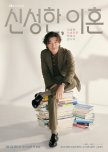
The story being told in an unagitated & well-rounded way unfolds its unique (I´d say: high) quality
"Divorce Attorney Shin" is actually based on the webtoon of the same name by Kang Tae-kyung. The KDrama comes with the handwriting of the same screenwriter as i.e. "Thirty Nine", "Always" and "Encounter" – Yoo Young-ah. In the case of "Divorce Attorney Shin" once again shows off her strengths: drawing true-to-life, sensitive portraits of friendship and relationship dynamics with plenty of ordinary life of ordinary people. In "Divorce Attorney Shin" you get (also thanks to marvelous actors/actresses!!) authentic, lifelike characters and circumstances. In this case with sometimes maybe a bit weird, but loving details. With characterful esprit. Unagitated. At times a joy to the heart. Almost soul food."Divorce Attorney Shin" tells stories from the red-hot everyday life of many people in South Korea, which is increasingly about divorce. The number of divorces in the country is currently going through the roof. The topic becomes almost normal madness. KDrama understands this just as such. Divorce is normal. Not nice. Not desirable. Not originally intended. But often unavoidable as the next step. And sometimes maybe...
(A bit tongue-in-cheek: the title. Attorney Shin's name "Shin Seong-han" literally means "sacred" in Korean. Thus, his name tag "Shin Seong-han, Divorce" becomes a provocative play on words. Attorney Shin is also the man for the cases when the ´holy state of marriage´ has faltered...)
There are many reasons and circumstances behind such a momentous decision as divorce ( ... and it may always accompanied by a bit of shame and feeling of failure, which needs to be digested emotionally). Some of them come along enrobed in different cases. They are weaving their way around the frame of the story, the main focus of which are three old friends – above all, however, divorce lawyer Shin Sung-han. One of the recurring scenes is the small but finely drawn retro lawyer's office with a wooden sliding door that sometimes gets stuck, which you quickly grow fond of. Also, Shin's apartment with retro-style hi-fi, where he spends his evenings listening to loud Trot music, preferably singing and drinking soju from a wine glass. And then the cozy Ramyeon restaurant around the corner from the office. Added to this is the special relationship between Shin and a client who ultimately joins the team and another young lawyer, who somehow stumbles over Shins piano skills into the office. And then there's his own past as a gifted pianist and the reason why he's no longer one.
Kudos to the layered nuances that paint the complex environment in which divorce tends to be embedded. No divorce is like the other. But most of the time, divorce hurts or hurt started before and therefore led to it. "Divorce Attorney Shin" touches on a multifaceted assortment of backgrounds and triggers over the course of 12 episodes short-term critical circumstances and long-term effects, emotional suffering and opportunities, economic chains and hopes, social stigmas and societal prejudices, and then, too, self-doubt, as well as collateral damage and sacrifice. It's not always just 'the others' who are affected, but the controversial issue of divorce is getting very close to almost all of the protagonists. JTBC attacks a hot social topic with the KDrama.
"Divorce Attorney Shin" offers all this embedded in a variation of slice-of-life. Leisurely, cozy and enjoyable – and therefore digestible. But it's not at all harmless. There is plenty of law-and-order with a comprehensive arc of suspense. On the one hand, this is the professional talent of our protagonist – although not his only one. On the other hand, there is his own family history, marked by the pain of separation and divorce, which is unexpectedly stimulated anew. The dramaturgical dynamic of the story is increasingly gaining momentum and ultimately steers inevitably towards Shin's very personal showdown, where justice is fought – not with firearms or fists, but according to the law, with evidence and with a sense of proportion, heart and mind.
In my opinion, the story finds an extremely fine nuance on all levels, which shows an ever deeper effect over time. Subtle but lasting. I would associate (not timbal, but) Koshi chimes – depending on topic and episode, sometimes more in the timbre of Aqua, sometimes more in the timbre of Aria, sometimes more in the timbre of Ignis, and sometimes more in the timbre of Terra... The story being told in a coherent and well-rounded way unfolds its very unique (I´d say: high) quality.
-----------------------------------------------------------------------------------
SIDE NOTE: --- Trot ---
KPop is a 2000ff phenomenon in Korean music history and by now even most non-KDrama fans are familiar with it. ´Trot´ however probably is less known. But beware: maybe in the not too distant future there will also be a KTrot, who knows...
'Trot' dominated the Korean music scene – as the earliest form of popular music in the peninsula. Trot is less well known to the rest of the world, but has experienced an enormous revival in its own country in recent years, which is now taking the genre even beyond national borders, too. "Divorce Attorney Shin" presents one of the hits, which was released brand new in 2020 on the CD "9 Stories" by Trot old master Na Hoon-a. The 72-year-old landed a megahit, with its YouTube video being viewed 25 million times and thus temporarily relegating the superstars BTS and Blackprint to their places. Korean cultural export strategists are smart and quick. The song promptly finds its well-staged place in the appropriate KDrama with "Divorce Attorney Shin", which also takes the direct route to the international audience via the Netflix streaming platform…
'Trot' grew on Korean soil and is quite retro in its foxtrot and slowtrot beat derived from standard dance. 'Trot' goes back to the time during the Japanese colonial period and the import of the 'enka', mixed at that time with the folksy, epic pansori lamentations (at least for me often reminiscent of flamenco), as well as the traditional aesthetically harmonious, lyric poem form Siga. However, due to its entangled roots with the Japanese 'enka', 'Trot' fell under censorship from the 1960s onward and only resurfaced in the 1980s. However there was also J-pop , hip hop and rap allowed to reach the masses and with that influence the then upcoming new and hip KPop pushed 'Trot' into the background.
Only now, when KPop is firmly established, does interest and space for something 'new', identity-establishing traditional obviously open up again. There may be something old-fashioned about ´Trot´, since young people are more familiar with it via their grandparents generation. However, the music triggers a nationally rooted, melodramatic emotionality... It's quite possible that a contemporary, new variation of internationally hip KTrot will develop over the course of the next few years. At least the trot is rediscovered – not first – but also by "Divorce Attorney Shin"...


 9
9 39
39 15
15















